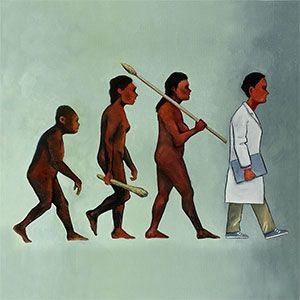ISSUES IN PDF FORMAT
November 2025
cover story one
Prioritizing Mental Health Well-being: Fostering a better informed society
BY Todd Archbold, LSW, MBA
The increasing prevalence of mental health issues, particularly among children and adolescents, is alarming. The National Institute of Mental Health reports that nearly one in five youth from 13 to 18 experiences a severe mental disorder at some point in their lives, and in nearly 70% of cases, the onset of symptoms occurs before 14.
October 2025
cover story one
The Rise of Health Misinformation and Disinformation: Recognizing the Truth
BY Robin Austin, PhD, DNP, RN, DC, AND Katheren Koehn, MA, RN
In today’s digital world, health misinformation and disinformation can spread faster than ever, often outpacing the ability to identify and provide accurate updates from reliable sources. Misinformation is defined as information that is false, inaccurate or misleading according to the best available evidence at the time.
SEPTEMBER 2025
cover story one
Artificial Intelligence in Medical Practice: Something is finally working
BY Ryan McFarland, MD
As early as the 1960s, when a computer able to accomplish only fairly minimal tasks took up an entire room, early users figured they would develop applications for medical practice. The Mayo clinic started working on the concept of the electronic health record (EHR).
July 2025
cover story one
Diplomatic Defiance: Tools for courageous leadership
BY Wendy Dean, MD
Last week, a colleague we’ll call Kelly told me that a loved one had recently undergone a procedure that had traumatized them both. Kelly grew up with a physician parent and was surrounded by physician family friends who were staunch patient advocates, trusted experts and community leaders. She is a non-physician clinician, who works on a medical team.
June 2025
cover story one
Weaponizing Language: Finding a better way
BY David Hamlar, MD, DDS
M any of us in everyday jobs tend to watch the world, and more specifically our country, evolve in a slow-paced methodical manner. Unfortunately sometimes politics or the latest news cycle can create cause for reaction, and that seems to be what’s occurring right now.
April 2025
cover story one
Broadening the Lens: Improving health data measurement
BY Liz Cinqueonce, MBA, and Kate Hust, MD, MPH
Since its founding, MN Community Measurement (MNCM) has played a pivotal role in Minnesota’s health care landscape. Over the last 20 years, following a mission to empower health care decision makers with meaningful data to drive improvement, MNCM evolved from a small collaborative initiative into a statewide leader in health care measurement and reporting.
MARCH 2025
cover story one
Volatile Organic Compounds: A beacon of hope
BY David R. Brown, MD, DSc, Bradley S. Miller, MD, PhD Andre Lamontagne, BEE, MBA
Volatile organic compounds (VOCs) have been well known entities in the industrial space, particularly, but not exclusively in petroleum and natural gas refining. Their emergence, however, as potential biomarkers has been pursued only in the last decade for applications in health care and environmental surveillance. VOCs are small molecules usually in the one-to-four carbon range.
JANUARY 2025
cover story one
Maps of Healing: Rural Horizons of Tertiary Care
BY ateh Bazerbachi, MD
A silent crisis is unfolding across America’s heartland, threatening not just rural communities but one of the nation’s most vital economic engines. Beyond the headlines of supply chain disruptions and food security lies an even more pressing challenge: rural Americans are increasingly cut off from the advanced medical care that their urban counterparts take for granted.
OCTOBER 2024
cover story one
100 Most Influential: Health Care Leaders
We are pleased to present this special feature recognizing 100 leaders who help make health care in Minnesota a global model of excellence. Once every four years we invite our readers to submit the names of colleagues whose outstanding leadership can be acknowledged in these pages. We thank all those who participated in the nomination process and those who helped with the submissions.
AUGUST 2024
cover story one
Assessing and Advancing Community Health: The overarching value of equity
BY Brooke Cunningham, MD, PhD
Every five years, as part of our public health accreditation process, the Minnesota Department of Health (MDH) releases the Minnesota Statewide Health Assessment (SHA). The SHA is a comprehensive examination of health in our state. Because it focuses on health, it examines health outcomes and the health-related social factors that contribute to
JULY 2024
cover story one
Health Care at the Crossroads: Securing the future of patient care
BY LISA SCHWEIGER, MD, AND NICK venosdel, MD
The human psyche is remarkably adept at normalizing. While this confers an exceptional capacity for resilience, this plasticity frequently allows for the disallowable. Physicians are not immune to this. Health care leadership in the United States has undergone a disturbing transformation in the past 15+ years, as it has changed from a small scale, local and regional model led by physicians, to a system increasingly dominated by multi-state, national and multi-national
June 2024
cover story one
AI-Powered Olfactory Sensor Technology: The electronic nose in medicine
BY CHRIS CAMPBELL, CEO
The field of medical diagnostics is rapidly evolving with transformative advancements in every field. An area of particular significance involves the integration of artificial intelligence (AI) olfactory sensor technology. AI-powered olfactory sensor technology promises to reshape how we detect and diagnose a wide range of medical conditions,
April/May 2024
cover story one
Hospital at Home: Inside a growing trend
BY David W. Plocher, MD
Hospital at Home (HaH) is defined as a care management program designed to deliver acute care hospital services to medium acuity patients in their homes. While this model of care has been around for decades, there is recent growth in enthusiasm for its benefits. Its origins can be traced to the UK, Canada and Israel in the 1970s. In the United States, Johns Hopkins is credited for taking the first steps in 1995.
MARCH 2024
cover story one
Physicians and Adaptive Change: The little med school on the prairie
BY CINDY FIRKINS-SMITH, MD, MHCI, FAAD
Like many physician-leaders, I did not choose the path of leadership with any deliberate intent. But as physicians we are leaders, whether we think we are or not. We lead care-delivery teams, we lead patients in shared decision-making, and we lead at home and in our communities.
February 2024
cover story one
Freedom Echoing: A legislative fix for health care?
BY KIP SULLIVAN, JD
For over 50 years, Minnesota’s method of containing health care costs has not changed. Beginning with the Health Maintenance Act of 19733, we have relied on one iteration or another of the tactics pioneered by HMOs, including exposing doctors to financial incentives to reduce services, robbing doctors of their autonomy by imposing prior authorization and other forms of micromanagement, and limiting patient choice of provider.
January 2024
cover story one
Serious Illness Communication: Building a statewide standard of care
BY LORI BROSTROM, MB
Atul Gawande, MD, MPH, in his ground-breaking book “Being Mortal: Medicine and What Matters in the End,” talks about how medicine so often “fails the people it is supposed to help,” especially with respect to the elderly and those with terminal illnesses.
December 2023
cover story one
The Minnesota RETAIN Study: Chiropractic care in return to work issues
BY DEB ZURCHER, LAC, DC
Workplace injuries, and their resulting economic impact, make up a much larger issue than most people are aware of. According to the National Safety Council, in 2021 the financial impact was $167 billion and 70 million injuries occurred at work.
November 2023
cover story one
A Crisis in Home Health Direct Care: The Minnesota Solutions Model
BY JESSE BETHKE GOMEZ, MMA
The model of the health care delivery system in the United States has hospitals, clinics and specialty medical services on one side. On the other side are home health direct-care services, along with community-based services. The home health side is facing a complex crisis at the heart of which are personal care assistants (PCAs). Among other concerns, for individuals who rely upon PCAs for daily living, there is more demand than supply.
October 2023
cover story one
Shell Game Economics: Corporate medicine wins, you lose
BY DAVID FEINWACHS, MA, MHA, JD, PHD
Since 1984, most Minnesotans enrolled in Medicaid, a program funded by all taxpayers, have not really been able to choose their own doctor. For the past two years, Health Policy Advocates (HPA), a volunteer citizens’ group, has championed bills in the Minnesota legislature that would give all Medicaid enrollees the right to opt out of managed care. These bills, SF404 and HF816, could give all Medicaid recipients the freedom to choose.
September 2023
cover story one
The Minnesota CANDOR Act: Addressing adverse events
BY NELS E. DYSTE
On August 1, 2023, a transformative shift in health care communication took place as the Minnesota CANDOR Act (bill SF2909) came into effect. This legislation, inspired by similar efforts in other states, aims to revolutionize the way physicians and patients navigate the aftermath of adverse medical events (AMEs). With the increasing frequency of nuclear verdicts, Candor is a welcome new too.
August 2023
cover story one
Artificial Intelligence in Medicine: A look at where we are today
BY CHESLEY CHEN, MS, MBA
There’s been a lot of interest recently in artificial intelligence (AI) and rightfully so. The technology has made rapid advancements in the last several years and is already being used to automate tasks and improve workflows. And its ability to use human language can be surprisingly good.
July 2023
December 2025
cover story
Prioritizing Mental Health Well-being: Fostering a better informed society
BY Todd Archbold, LSW, MBA
October 2025
cover story
The Rise of Health Misinformation and Disinformation: Recognizing the Truth
BY Robin Austin, PhD, DNP, RN, DC, AND Katheren Koehn, MA, RN
SEPTEMBER 2025
cover story
Artificial Intelligence in Medical Practice: Something is finally working
BY Ryan McFarland, MD
July 2025
cover story
Diplomatic Defiance: Tools for courageous leadership
BY Wendy Dean, MD
June 2025
cover story
Weaponizing Language: Finding a better way
BY David Hamlar, MD, DDS
MARCH 2025
cover story
Broadening the Lens: Improving health data measurement
BY Liz Cinqueonce, MBA, and Kate Hust, MD, MPHB
MARCH 2025
cover story
Volatile Organic Compounds: A beacon of hope
BY DAVID R. BROWN, MD, DSc, BRADLEY S. MILLER, MD, PhD and ANDRE LAMONTAGNE, BEE, MBA
January 2025
cover story
Maps of Healing: Rural Horizons of Tertiary Care
BY Fateh Bazerbachi, MD
OCTOBER 2024
cover story
100 Most Influential
Health Care Leaders
cover story one
Navigating Drug Shortages: Preparedness and patient advocacy
BY DAVID J. MARGRAF, PharmD, PhD AND STEPHEN W. SCHONDELMEYER, PharmD, PhD
The health care industry is faced with an alarming rate of drug shortages, posing significant challenges for physicians and patients alike. In July 2023, there were 309 drug products in shortage according to the American Society of Health-System Pharmacists (ASHP)—a record high for the last decade. A large share of these ongoing shortages are sterile injectable forms of critical acute drug products that are used in emergency situations.
June 2023
cover story one
Moral Injury in Health Care: A growing concern
BY WENDY DEAN, MD
A few weeks ago, at the end of a talk about clinician distress, a physician in the audience stood up and said, “No one’s medical school application says they want to maximize profits for health systems. All of us – ok, except maybe one or two in every class who are mercenary – wanted to help people, and when we can’t do that anymore, it’s excruciating.”
MARCH 2021, VOLUME XXXIV, NUMBER 12



































